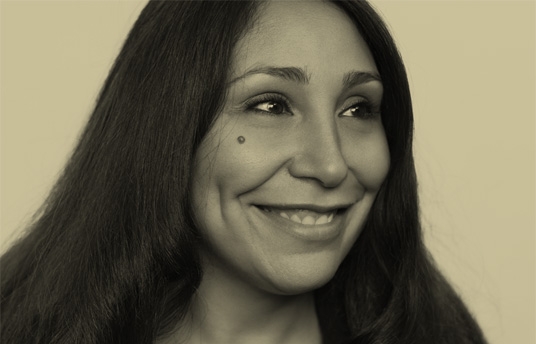أهل السينما: هيفاء المنصور
08 يناير 2013

هيفاء المنصور هي أول صانعة أفلام سعودية وأصبحت نموذجاً للنساء الراغبات في صناعة الأفلام في المنطقة. خلال مسيرتها، قامت هيفاء بصناعة أفلام عديدة عن تراث وتقاليد بلدها. عرض فيلمها الجديد “وجدة” في مهرجان البندقية السينمائي الـ 69 ومهرجان دبي السينمائي الدولي وحصل على إشادة وتنويه محلياً ودولياً. تمكن فريق التحرير في مؤسسة الدوحة للأفلام من مناقشة صناعة السينما مع هيفاء خلال حضورها لمهرجان الدوحة ترايبكا السينمائي 2012.
مؤسسة الدوحة للأفلام: هل يمكنك اخبارنا عن تجربتك في مشاهدة أفلام في المهرجان؟
المنصور: بعض الأفلام أفضل من غيرها. من الرائع أن أرى الشباب يستخدمون الفيلم كوسيلة في التعبير عن أنفسهم واخبار قصصهم لأننا عادة ما نعبر عن أنفسنا بالكلام. يعتبر الشعر وسيلة مهمة يمكن الأفراد من التحدث عن مشاعرهم وكيف يرون العالم باستخدام الكلمات والشعر. بالنسبة لهم انه شيء رائع استخدام وسيلة اعلامية مختلفة، وبالتالي فإن استخدام الصورة كوسيلة مختلفة للتعبير أمر رائع بالفعل. إنها مرحلة انتقالية لصناع الأفلام. ويعجبني الشباب الذين يتحدثون عن قصصهم وعالمهم. نحن نعيش في مكان محافظ جداً حيث لا يمكن للأشخاص البوح بامور معينة ومن الجميل جداً رؤية صناع الأفلام يزدهرون ويتقدمون في تصوير قصصهم.
مؤسسة الدوحة للأفلام: هل هناك مجموعة كبيرة من صناع الأفلام السعوديين يريدون سرد قصصهم؟
المنصور: نعم. السعودية دولة مثيرة للإهتمام لأنها محافظة جداً وتضم تنوعاً وجغرافيا وثقافات عديدة. وقد مرّت السعودية بالعديد من التغيرات السياسية خلال السنوات الثلاثين الماضية. كان لدينا أيديولوجيات محافظة خلقت جواً معيناً وجيلاً معين، لكن الناس بدأوا يخرجون من هذا الجو وأصبحوا يتعاملون مع العالم الجديد.
مؤسسة الدوحة للأفلام: هل ترين اليوم الذي سيحتضنون فيه صناع الأفلام السعوديين؟
المنصور: أشعر بأن رفض السينما في المملكة العربية السعودية آتية من الشعب.الأفراد في السعودية محافظون جداً وقد تربوا على ذلك ويعتقدون بأن السينما فاسدة وخطأ تهدد وجودهم معنوياً. فهذا يحتاج إلى وقت للتغيير وأشعر بأن هناك مسؤولية كبيرة تقع على عاتق صناع الأفلام. أعتقد أنه من المهم صناعة أفلام تجعل الأفراد يشعرون بالفخر وتقبل حركة جديدة في السينما. وأعتقد أن أفضل طريقة لإدخال السينما إلى السعودية هي التحدث إلى الشعب والتبيان لهم بأنك تريد صنع أفلام تشارك فيها الجماهير المحلية.
مؤسسة الدوحة للأفلام: كان هناك محاولات لقيام مهرجانات في المملكة ولكن تم إلغاؤها في اللحظة الأخيرة. كأن هناك مجموعتين مختلفتين في السعودية؟
المنصور: نعم… السينما، قيادة النساء للسيارات، هذه قضايا يتم استقطابها دائماً في مجموعات معينة. لدينا الليبراليون والمحافظون والجميع لديه قضية يريد القتال من أجلها. بعض القضايا مستقطبة للغاية والسينما هي واحدة منهم، ولكن اعتقد بأن السينما تبتعد قليللاً عن هذا لأنها ممتعة والسعوديون لديهم تذوق للسينما، فهم يسافرون إلى البحرين لمشاهدة الأفلام وبالتالي فهي تصبح قضية أقل جدلاً.
مؤسسة الدوحة للأفلام: هل تعتقدين بأن الوسائل الإعلامية غير التقليدية كعرض الفيديوهات على الإنترنت سيساعد على نمو الثقافة السينمائية في السعودية؟
المنصور: نعم. بالتأكيد، أي وسيلة للوصول إلى الأفلام عند السعودين هي مهمة. الحقيقة هي أن السعوديون يحبون الدي في دي وتعتبر نسب بيع الدي في دي الأعلى على الإطلاق . يتوجه الأفراد لاستئجار الأفلام ولذلك أشعر انه من المهم صناعة أفلام مقنعة. اذا قاموا بفتح صالات عرض، أود أن تعرض أفلام من صناعة الدولة نفسها . بالنسبة لي يجب على صالات العرض أن تدعم الأصوات المحلية على الأقل. ولكن سيحدث هذا التطور في السينما المحلية إذا صنعنا أفلام تمثل الشعب. وهي مسؤوليتنا كصناع أفلام ويجب ان لا نكون سلبيين كمجموعة من الفنانين، بل يجب ان نصنع ذلك لأنفسنا.
مؤسسة الدوحة للأفلام: كان هناك الكثير من الإعلام حولك خلال العام الماضي بسبب فيلمك، هل شعرت بأي رد فعل سلبي من المحافظين؟
المنصور: أحياناً، ولكن أحاول دائماً المحفاظ ةعلى هذا الاحترام. لا أحاول أن اكون مثيرة للجدل لمجرد المتعة. أحاول دائماً التحدث معهم وفتح حوار وأقول “أحترمكم وأريد التحدث اليكم” ولكن يتضايقون. يكتبون أشياء كثيرة على تويتر ولكن في النهاية عندما اتحدث، أتحدث كامراة محلية ليشعروا بأنني ابنتهم. اتمنى ذلك.
مؤسسة الدوحة للأفلام: تعيشين في البحرين. هل يعتبر هذا شيء ايجابي لصانعة أفلام؟
المنصور: أعيش هناك بسبب عمل زوجي فقط. بالنسبة لي كصانعة أفلام أذهب إلى منزل أمي كل اجازة اسبوع لأحصل على قصص والهام. السعودية دولة غنية بالقصص.
مؤسسة الدوحة للأفلام: سؤال اخير. هل يمكن ان نعرف ما هو أفضل فيلم شاهدته في حياتك؟
المنصور: ليس لدي فيلم مفضل ولكم أحب أفلام الأخوين كوين، كل أعمالهم، فهم أذكياء جداً. أحب “ويس اندرسون” و“روسيتا”. “روسيتا” أحد الأفلام الذي يكون فيه امرأة قوية بطلة الفيلم، وأحب ذلك.